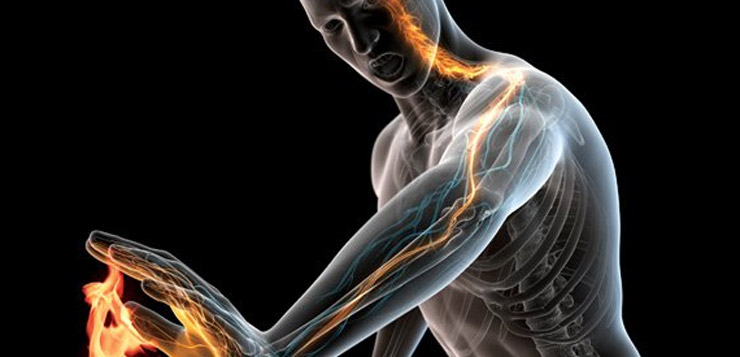It’s lightning-fast and every bit (even the scream) serves a purpose.
Your nervous system is designed to help you respond to pain with astounding speed. Good thing, too—if the reaction were slower, a simple cooking burn could end up threatening your life. Let’s walk through the process:
1. THE POINT OF INJURY
Your nerve cells maintain a delicate balance of sodium, potassium, and calcium. If you grab the handle of a hot frying pan with your bare hand, that balance goes awry. Sodium begins crossing the cell membranes, and when enough enters the cells, the nerves fire off a tiny electrical charge—about one-thousandth the strength of a doorbell’s current.
2. THE OUTER ROAD
Different nerve fibers carry different types of pain—mechanical, chemical, or thermal. The electrical signal coming from your just-singed palm selects the relevant nerve fiber, jumps on board, and shoots toward your spinal cord.
3. THE NERVE CENTER
All pain signals will eventually reach your spinal cord. The one originating from your hand will enter in the middle to lower part of your neck, somewhere between the fifth and seventh vertebrae. The exact entry point depends on where you were hurt—pain that originates from your thumb, for example, enters at the fifth vertebra.
4. THE PROCESSING ZONE
After traveling through your spinal cord, the signal hits your brain’s receiving center, the thalamus. For a heat injury, the entire journey takes 0.01 second. And that’s actually slow; chemical and mechanical nerve fibers work at 10 times that speed. Your thalamus now modulates the pain to reflect the perceived risk, and then sends it on for interpretation in your cerebral cortex.
5. YOUR REACTION TO THE PAIN
You Pull Away
This is the most primal response you can have to accidentally pan-frying your hand. “Your body is wired to save your life,” explains MH family medicine advisor Ted Epperly, M.D. “So it reflexively jerks your hand back.”
You Swear or Scream
Letting loose with a string of obscenities (or a high-pitched, head-swiveling shriek) may actually serve an evolutionary purpose. “It could have been used to warn others that danger is around,” says Dr. Epperly. Watch out: Man cooking!
You Pass Out
This less-than-heroic response is to spare you unbearable pain, but it’s pretty rare, says Dr. Epperly. “Generally, your body wants to stay alert so it can move you away from harm.” Besides, if you pass out, the steak will burn.
Source: www.menshealth.com






